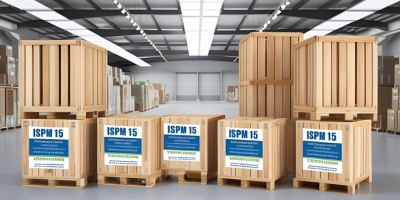A R T I C L E
ISPM 15: Global Packing Rules

Published on April 18, 2025 | 5 mins read
International Standards for Phytosanitary Measures No. 15 (ISPM 15) is a globally recognized regulation developed by the International Plant Protection Convention (IPPC). It aims to prevent the spread of pests and diseases through wood packaging materials (WPM) used in international trade.
Why ISPM 15 Matters
Wooden pallets, crates, and dunnage can harbor invasive insects and pathogens that pose threats to agriculture and forestry. ISPM 15 ensures that these materials are treated properly before they are used in shipping, safeguarding ecosystems worldwide.
Materials Covered Under ISPM 15
ISPM 15 applies to all solid wood packaging materials that are thicker than 6 mm, including:
- Wooden pallets
- Wooden crates and boxes
- Wooden dunnage (blocking and bracing)
- Cable drums and spools made of wood
Approved Treatment Methods
To comply with ISPM 15, wood packaging must be treated using one of the following approved methods:
- Heat Treatment (HT): Wood must be heated to a minimum core temperature of 56°C (132.8°F) for at least 30 minutes.
- Methyl Bromide (MB) Fumigation: The wood is fumigated with methyl bromide gas, although this method is restricted in many countries due to environmental concerns.
The ISPM 15 Stamp
Once treated, wood packaging is marked with the ISPM 15 stamp, often referred to as the "wheat stamp". This mark includes:
- The IPPC logo
- A two-letter country code (e.g., US for United States)
- A unique number assigned to the treatment provider
- The treatment type (HT or MB)
This stamp is essential for customs clearance and is inspected at international ports of entry.
Exemptions to ISPM 15
The following materials are exempt from ISPM 15 regulations:
- Plywood, particle board, oriented strand board (OSB), and other engineered wood products
- Paper and cardboard-based packaging
- Plastic, metal, or other non-wood materials
Global Compliance and Enforcement
More than 180 countries have adopted ISPM 15. Non-compliant shipments may face re-export, treatment fees, or destruction of goods. Compliance not only avoids penalties but also ensures smooth global supply chain operations.
ISPM 15 plays a critical role in safeguarding plant health worldwide. By adhering to these packing rules, businesses contribute to sustainable trade and environmental protection. Whether you're a manufacturer, exporter, or logistics provider, understanding and complying with ISPM 15 is essential for global shipping success.
Related Articles:
Tags:
Subscribe to Sealine Journal
Stay updated with the latest logistics and supplychain insights.
Subscribe Now!